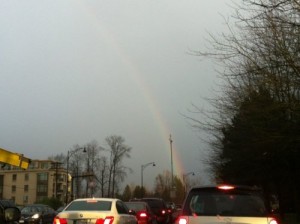Posts Tagged ‘priority’
The Trouble With Our Schools Is Not ESL
In his English 104 lecture today at Simon Fraser University (SFU), Dr. Paul Matthew St. Pierre argued that our posts, tweets, texts, online articles, and other written forms of expression in the digital sphere are published works.
By publishing via these new media forms, we become authors and contributors to digital culture. I, for one, am grateful that technology has made this access to publication possible. In almost three years of writing for my blog, I’ve been able to put forward opinions on a range of topics for consideration.
However, by publishing on my blog, I’m certain readers know the content of each article represents my own personal opinion albeit informed by my experience, my work, my position, and my reflections on what I may have read, seen, and heard.
In contrast, opinion pieces published in traditional mainstream media publications, such as The Vancouver Sun, are imbued with the aura of a journalistic standard even when they too are statements of personal opinion. Even when marked with the label “Opinion”, as with today’s column by Shelley Fralic, this apparent legitimized authority can be problematic.
Why?
Simply put, because today’s contribution on the public education system by Ms. Fralic was poppycock.
The trouble with our schools is not spelled ESL as Ms. Fralic contends. Rather than spotting an elephant in the room, she has spotted a mouse and while focused on the “wee … tim’rous beastie,” running across the room to escape, she’s missed the herd of elephants standing right behind her.
It is true that the number of English Language Learners (ELL, previously ESL) is rising in our classrooms, particularly in the Metro Vancouver area. And it is true that more ELL students has contributed to greater complexities in terms of class composition. But does Ms. Fralic — or anyone else for that matter — really believe that removing ELL students from our classrooms would somehow magically eliminate the issues we face?
It’s preposterous because the problem with our schools — the real elephant in the room — is the slow steady erosion of government support which has seen, based on court estimates, approximately $300 million per year kept out of the public education system. That’s money which would have provided programs, resources, and services to all students including the help of specialist teachers.
And here’s the thing: the students who need the help of those specialists may be ELL students, and often they are not. Students arriving for kindergarten without adequate pre-literacy skills may be ELL students, and often they are not. The truth is obstacles to learning, whether speech impediments, learning disabilities, behavioural issues, or other, are not specific to any one culture or any one language.
Neither is poverty.
Neither is economic inequality.
And these are among the real obstacles to better functioning classrooms along with the lack of adequate community resources for all families, whether new to this country or not.
The reality is — as I witnessed in the school my child attended last year — a large number of ELL students introduces an amazing level of diversity into a school community. The learning opportunities, with the exposure to a variety of cultures, are magnified. And the emphasis on inclusion introduces a depth of acceptance that is unparalleled.
That’s how we build understanding. That’s how we build a society. That’s how we build tolerance.
ELL students are the ones who will emerge from our public education system fluent in more than one language: an invaluable asset in our globalized world.
And, their multi-lingual, multi-cultural sensibility is one they will put to good use in making their contributions to Canada and to Canadian culture.
From Job Action To Job Action To … ?
When I chose to run as a candidate in the 2011 municipal elections, the K-12 public education system in British Columbia was embroiled in job action.
Almost three years later, the public education system in British Columbia is once again contending with a job action which many are calling the worst ever for the sheer rancour of the debate, the barbed rhetoric which abounds, and the crumbling relationships.
In other words, my entire term as a Trustee on the West Vancouver Board of Education has been characterized by the lurch from one job action to another.
While bargaining has chewed away at my time as a Trustee, it’s insatiable appetite has also served as an obstacle to discussions and innovations on a number of educational topics.
Why?
Because if you’re consistently caught up in trying to clean up the mess your guests have made with the appetizers, you’ll never have the chance to sit down with your company to enjoy the main course.
If our focus is concentrated on bargaining issues, what are we not talking about? Here’s a short-list of “big picture” items which I feel are overshadowed by the labour situation whether at a local level or provincially (in alphabetical order):
Accountability
- which Ministry reports are essential and which ones aren’t?
- is there a way to simplify school district financial reporting to ensure better utilization of staff time and resources without sacrificing the integrity and thoroughness of the information required?
- aside from the issue of underfunding, is it time to review the current funding formula?
Assessment (I know much has been done in this area and some school districts have already begun experimenting with different approaches, but I’m afraid that work has been disrupted and the information won’t be available for sharing as best practices with others.)
- what should report cards look like at each level in the K-12 system?
- how do we continue to move forward on implementing models of formative assessment?
- is there a different way to organize credits at the high school level to enable a more flexible route to graduation rather than one based strictly on work in school or on a progression through grade levels?
Age Groupings
- is grouping students according to their age still the desired approach to education?
- how do we balance the advantages of early learning with the fact that for some students a later start into a formal school environment may be more desirable?
- do all students require a full five years of secondary education or should there be a fast-track option for some learners?
Calendar (some districts are already working with different calendars)
- do we have to start school in September and stop in June with the traditional breaks at the end of each calendar year, for spring break, and so on?
- are balanced calendar models more successful for students and their families?
- what are the logistical barriers to changing the calendar within a district? That is, does it work well to have one or more schools on a different calendar or does it work better to change all at once?
Community Links
- how do we break through the walls between our communities and our schools to improve and increase relevancy and connections?
- what sort of partnerships can we build with our community without compromising the integrity of our public education system?
- how do we draw on the expertise and skills of our community members to further enhance and support school learning and the work of our educators?
These are some topics I yearn to delve into along with other issues such as the new curriculum, pre-service requirements for future educators, and the structure of practicums for student teachers.
Oh, and what exactly is a teacher’s role and what do we even mean by education in today’s world?
And while I believe that a negotiated settlement is the best foundation from which we may be able to enter into a progressive and enlightening discussion on many of these issues, it makes me very sad to acknowledge that the time needed to repair relationships once a deal is signed means we may not have the time we need to talk about such things substantively let alone implement them before we’re at the bargaining table again!
In the meantime, school districts continue to strive to do the very best for the families of this province but if each electoral mandate continues to be a Ben Hur-like chariot race from one set of failed negotiations to another, we will — all of us — have failed in our duty to build a better world for our children.
It will be a collective failure of imagination.
Class Size and Composition: A Birthday Party Analogy
Issues of class size and composition tend to polarize the discourse about public education.
These issues are complicated because ideological positions inform much of the debate which is often emotional, replete with language around justice and economics, anxiety and flexibility, discrimination and fairness.
They also encapsulate a tug of war between the needs of students, the workload ramifications for teachers, the expectations of parents, and the managerial criteria of governments.
I want to explore these issues using the analogy of a birthday party.
Why?
Because we’re stuck in a gladiatorial arena where arguments on class size and composition are discussed in terms of competing narratives.
This restricts our ability to forge solutions and negotiate settlements rather than helping us forge fair and equitable resolutions. So why not try a different lens?
Let’s take a typical six-year-old in British Columbia who is turning seven. Which is easier to host: a birthday party for 12 or a birthday party for 20?
All factors being equal, one would be inclined to say a party of 12.
But wait. What if you have to tend to all the details for a party of 12 with no help? That could be much more work than booking a birthday package for 20 at a local community centre where all, or most, of the details are taken care of.
However, what if that group of 20 at the recreation centre includes a handful of children who do not take well to group activities? It may still be less work, but it may be as stressful as, or more stressful than, the small party for 12 at home. And that small party of 12 at home might be a lot less work if you have the help of family members and friends.
This may be a frivolous analogy, but it demonstrates a key idea: class size is important, but it’s not the only factor to consider with regard to structuring a successful learning environment. That’s why those who claim that class size doesn’t matter, in my opinion, are erroneously emphasizing short-term economic efficiency. Those who claim class size can be addressed as a formula are prioritizing workload considerations.
I think we need to figure out a new system for public education, one which supports smaller class sizes, allows the flexibility for larger class sizes where supportable, and in all cases supplies the resources and help required to ensure an optimum learning environment. In my imagined structure, a school district may very well have Grade 1 classes of differing sizes whether of 6, of 12, of 20, of 24, and even, depending on many other factors especially support services, 30.
Wait a second.
I overlooked the most important question.
Whose birthday party is it? What type of birthday party does the child want? Is he an introvert better-suited to small gatherings at home? Is she an extrovert better suited to a significant gathering with lots of activity and her as the centre of attention? Alternatively, would he or she really rather not bother with a party at all even at six years old?
Unfortunately, that’s the question which is often overlooked in the fractured and fraught discussion about class size and composition.
And yet, it is about the kids. Isn’t it?
Getting to Know Me and You
In a recent blog post, Chris Kennedy, Superintendent of Schools for West Vancouver, issued a challenge which involves providing 11 random facts about one’s self, answering 11 questions, and posing 11 questions for others to answer.
I don’t have an athlete’s competitive gene in the way Chris does, but I’m not one to pass up a challenge — particularly one which offers an easy way into kickstarting my blog for the year.
So here goes:
11 Facts About Me
- I’m the eldest child in my family and I use birth order psychology to rationalize my tendency to be bossy.
- Athletic competition is not my forte, but I was a competitive swimmer when I was younger.
- And while I may not be an athlete, my competitive instincts do tend to arise if faced with a New York Times crossword puzzle, a game of Trivial Pursuit, or any sort of game involving my five nephews.
- I was one of the original hosting staff hired for Expo 86 in Vancouver. I worked in the pre-fair period, first at the display pavilion conducting tours of the site model, and later at the Expo Centre which eventually became Science World.

- Although I did have that experience with Expo, I resigned my position before the Fair actually opened – not one of the best decisions I’ve ever made.
- I lived in Toronto from 1986 to 1992 and worked for a variety of companies including Addison Wesley Publishers, Canada Mortgage and Housing Corporation, and Rogers Cablesystems. I also obtained my MBA from the University of Toronto while there.
- During my time in Toronto, I took creative writing lessons through the Continuing Education department at the U of T. My instructor, for two terms, was Anne Michaels who subsequently found much acclaim with the publication of her novel Fugitive Pieces among other works.
- I still have the letter Ms. Michaels wrote to me at the end of one term (she wrote a letter for to each student) encouraging me to give myself the gift of time to write. I have to admit, I’ve never quite learned how to do so, but I still may.
- While working for CMHC, I was seconded to the G8 1988 Economic Summit and worked in the media centre. I think I may have caught a glimpse of Margaret Thatcher once from a very great distance!
- My return to Vancouver in 1992 was prompted by a number of factors, primarily the impending birth of my first nephew. That’s one of the best decisions I’ve ever made because it brought me back home and allowed me to play a bigger part in his life, and the lives of his brothers, than I may have been able to from far away.
- September 2014 will mark 40 years since my family moved to British Columbia and settled in West Vancouver.
Questions from Chris Kennedy:
- If you could only watch one television station what would it be? CBC Newsworld
- Looking back at your schooling, what was the silliest rule your school had? I don’t remember which is probably a clear indication that school rules aren’t as effective as we’d like them to be. Or it may only be evidence of my memory issues!
- Who is the greatest ever Canuck? I’m sure I’d answer this differently every day and we’re lucky to have so many choices. Today I’m going to pick Lester B. Pearson because I believe he was a man who had a vision of how Canada could operate on the world stage in a manner which promoted peace and reconciliation. Our political leadership now seems to have abdicated that position. [Editor’s Note: I realize now Chris meant the hockey team and not Canadians in general in which case I’ll say Trevor Linden although I was also a Harold Snepsts fan. Oh, and Kirk McLean.]
- What is the greatest rock group of the 1980s? Please see the note above re memory issues. I was a Fleetwood Mac enthusiast and also a fan of the Little River Band, but I think that may have been more reflective of the 1970s.
- What is something education related you have changed your opinion on over your career? Assessment although not necessarily academic honours and awards.
- What is the warmest place you have ever been — and how warm was it? China in July 2009. My eyeglasses would fog up as soon as a I stepped out of the hotel lobby and I remember being drenched in perspiration from morning to evening.
- Poorest fashion trend you have seen in schools in the last 10 years? Ugh to Uggs.
- What was more frustrating to deal with in your school — Pokemon cards or silly bands? Luckily my role precluded the need to deal with this issue.
- Describe your favourite high school teacher in four words. Miss Lysell: dramatist extraordinaire inspiring imaginations.
- What is the best reason to go on Facebook at least once a day? For a smile while refreshing connections with friends and family, near and far.
- If blogging was outlawed tomorrow — what would be your reaction? Phew!
11 Random Questions for You:
- When you think back to your time as an elementary and/or high school student, what’s the one thing you wish had been done differently?
- What’s your favourite movie and why?
- If you were asked for one piece of advice to offer a first year student at a post-secondary institution, what would it be?
- What was your favourite song of 2013 and why?
- Who would you say serves as the best role model for young people today?
- Think about the work you’re doing now. Is it part of a career you had planned on or are you doing something you had never thought of doing when you were younger?
- If you could pitch an idea for a television show, what would it be? (Credit for this question goes to my son!)
- On a sunny day, do you make every effort to get outside or do you sometimes prefer to stay at home?
- If you had to choose one animal to best describe who you are, what would it be? (I was once asked this question in a job interview!)
- What do you think is one thing we could do to encourage more young people to vote in municipal, provincial, and federal elections?
- What is one change you hope to make in 2014?
I Challenge the Following People to do their “Homework”:
As Chris did, I extend the challenge of this activity to the educational community in the West Vancouver School District including parents and students who write and maintain blogs. I’d also like to extend the challenge to Trustees throughout British Columbia. It’s an interesting way to allow our communities to get to know us just that little bit better beyond our role as advocates for the public education system.
The Speed of Life
Math was not my favourite subject in high school, but I was proficient with the material presented. Decades later a modicum of what I learned is hardwired for my general use, but don’t ask me to explain an advanced concept and please save me from anything that has to do with calculating probabilities.
One formula that has stuck with me is d = rt or distance (d) equals the rate of travel (r) multiplied by time (t). And while familiarity with the relationship between these three factors comes in handy for planning, lately I’ve been thinking about the formula’s applicability in a different way.
Why?
Because I think the distance we travel daily contributes to the feeling we have that life is hurtling by us at breakneck speeds.
On days when I teach, for example, the 25 kilometre journey to SFU’s Burnaby campus takes me about thirty minutes each way if traffic is flowing smoothly. That’s nothing compared to those who may commute in to Vancouver from the Fraser Valley or drive down each day from Squamish or ferry over from the Sunshine Coast.
Compare that to the daily distance my Grandmothers would have travelled as young women, my paternal Grandmother in rural Lebanon and my maternal Grandmother in rural Jamaica. Until they married, their circle of travel likely extended no further than 10 kilometres, by foot, over the course of a day.
We have extended the distances we travel dramatically and not just for essentials. How many consider a drive to the Bellis Fair Mall, a three-hour roundtrip from the Lower Mainland depending on border waits, a simple excursion? Or consider how cavalier we have become about booking vacations requiring hours if not days of travel?
So if the distances we traverse have become more extensive, and if you accept that our time is fixed (not just in the sense of 24 hours a day, but in the finite sense of our mortality), it would seem that the factor which has changed the most with regard to our day-to-day is r, the rate.
And that may help explain why it feels like we are living at a faster and faster rate, one which increases with each passing year.
Is it any surprise then, as we’re preparing to celebrate the arrival of the new year, that many of us wonder what happened to the old one? How is it that we are celebrating graduations when it seems like just yesterday we were celebrating the births of the children in our families?
And nothing drives home the finite nature of time as much as the loss of those around us, whether people we’ve known and loved, young and old, or strangers from far away whose images fill the news.
That’s why it’s vital to recognize, sooner rather than later, in our instantaneous 140-character world, that we do not have another now.
And unless we take control of the speed of our life, it will pass by in a blur.



